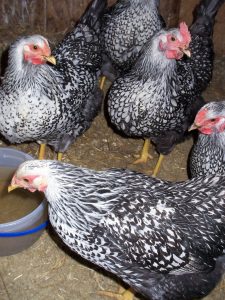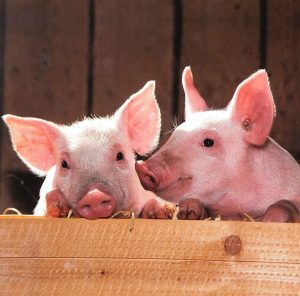As you work to protect yourself from the flu this season, don’t forget about your pets and livestock. While animals don’t get our human strains of flu, there are separate strains that can affect different species:
 Avian influenza, or bird flu, most often affects waterfowl such as ducks and geese, but these birds can transmit the disease to poultry flocks. Some strains of bird flu can be transmitted to humans and other mammals, so the disease is closely monitored. The Colorado Department of Agriculture has information on avian influenza on their website. You can read more about avian influenza in these publications available from our library:
Avian influenza, or bird flu, most often affects waterfowl such as ducks and geese, but these birds can transmit the disease to poultry flocks. Some strains of bird flu can be transmitted to humans and other mammals, so the disease is closely monitored. The Colorado Department of Agriculture has information on avian influenza on their website. You can read more about avian influenza in these publications available from our library:
- 2006 Surveillance to Detect Highly Pathogenic Avian Influenza in Wild Birds in Colorado
- Avian Influenza: About Avian Influenza Viruses and the HPAI H5N1 Strain
- Avian Influenza (Bird Flu): Questions and Answers
- The Bird Flu and You: Information for the General Public on Avian Influenza and What it Means to You and Your Family
- Poultry Disease Management Plan
 Canine influenza, or dog flu, was first found in the United States in 2015. Don’t be fooled by the name; according to the American Veterinary Medical Association, cats can also be susceptible to dog flu. Dog flu can be highly contagious so many kennels and pet care facilities now require canine flu vaccinations. Dog flu is not transmissible to humans.
Canine influenza, or dog flu, was first found in the United States in 2015. Don’t be fooled by the name; according to the American Veterinary Medical Association, cats can also be susceptible to dog flu. Dog flu can be highly contagious so many kennels and pet care facilities now require canine flu vaccinations. Dog flu is not transmissible to humans.
Equine Influenza usually isn’t fatal to horses, but can still be a problem especially for competition and show horses, who would have to miss events if ill, according to Colorado State University’s Veterinary Diagnostic Laboratories. They have posted equine vaccination guidelines on their website.
 Swine Influenza affects pigs but is also thought to be the type of flu that caused the 1918 influenza epidemic. You can read about it in the article The Zoonotic Potential of Swine Influenza, from CSU’s Veterinary Diagnostic Laboratories. Also see the fact sheet H1N1 Influenza and Pigs and the Colorado Department of Agriculture’s Swine Emergency Disease Response Plan.
Swine Influenza affects pigs but is also thought to be the type of flu that caused the 1918 influenza epidemic. You can read about it in the article The Zoonotic Potential of Swine Influenza, from CSU’s Veterinary Diagnostic Laboratories. Also see the fact sheet H1N1 Influenza and Pigs and the Colorado Department of Agriculture’s Swine Emergency Disease Response Plan.
- How to Spot the Differences Between Eagles and Hawks - August 16, 2021
- How Transportation Projects Help Tell the Story of Colorado’s Past - August 9, 2021
- Time Machine Tuesday: The Night the Castlewood Canyon Dam Gave Way - August 3, 2021
